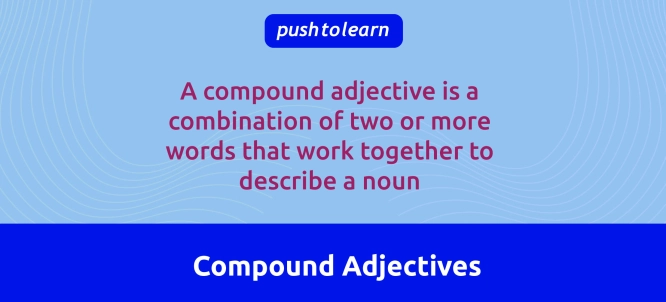by PushtoLearn
Compound Adjectives
Table of Contents
Compound Adjectives – Exercises
These exercises focus on Compound Adjectives
What Are Compound Adjectives?
A compound adjective is formed when two or more words are combined to describe a noun as one idea. These words are often joined with a hyphen. For example:
-
A well-known actor
-
A full-time job
The purpose of a compound adjective is to give a more detailed and specific description.

When Should You Use a Hyphen?
Using a hyphen correctly is essential because it prevents misunderstandings. Here are the rules:
|
Placement |
Hyphen Rule |
Example |
|
Before the noun |
Use a hyphen. |
A high-quality product |
|
After the verb |
Usually, no hyphen is needed. |
The product is high quality. |
Why Hyphens Matter:
The presence or absence of a hyphen can change the meaning of a sentence:
-
He is a large truck driver (The driver is large).
-
He is a large-truck driver (The truck is large).
Types of Compound Adjectives
Compound adjectives can be formed in various ways. Here are the most common types:
1. Adjective + Present Participle (-ing)
This form describes ongoing actions or qualities.
-
A long-lasting battery
-
An easy-going teacher
2. Adjective + Past Participle (-ed)
This form describes completed actions or conditions.
-
An old-fashioned idea
-
A short-lived romance
3. Adjective + Noun
The noun is always singular in these combinations.
-
A full-length movie
-
A short-term contract
4. Noun + Present Participle (-ing)
These describe the function or characteristic of something.
-
A time-consuming task
-
A mouth-watering meal
5. Noun + Past Participle (-ed)
These describe something influenced or modified by the noun.
-
Sun-dried tomatoes
-
A wind-powered car
6. Noun + Adjective
These describe the condition or quality of something.
-
World-famous athletes
-
Sugar-free drinks
7. Adverb + Past Participle (-ed)
Adverbs modify the action in the adjective.
-
A well-educated person
-
A densely-populated city
8. Number + Noun
Numbers combined with nouns describe measurements or quantities.
-
A five-minute break
-
A two-room apartment
Key Rules for Forming Compound Adjectives
|
Combination |
Example |
|
Adjective + Present Participle |
A slow-moving train |
|
Adjective + Past Participle |
A well-known author |
|
Adjective + Noun |
A long-distance runner |
|
Noun + Present Participle |
A record-breaking score |
|
Noun + Past Participle |
Grass-fed beef |
|
Number + Noun |
A three-bedroom house |
|
Number + Body Part + -ed |
An eight-legged spider |
|
Adverb + Past Participle |
A highly-respected judge |
Common Errors and How to Avoid Them
-
Forgetting the Hyphen:
-
Incorrect: She is a well known scientist.
-
Correct: She is a well-known scientist.
-
Using Plural Nouns in Compound Adjectives:
-
Incorrect: A five-days trip.
-
Correct: A five-day trip.
-
Placing the Compound Adjective Incorrectly:
-
Incorrect: The decision last-minute was difficult.
-
Correct: The last-minute decision was difficult.
-
Omitting Hyphens in Numbers:
-
Incorrect: I need a 3 bedrooms flat.
-
Correct: I need a three-bedroom flat.
Everyday Use of Compound Adjectives
Here are some examples of compound adjectives in real-life scenarios:
|
Context |
Example |
|
Time |
A two-week vacation |
|
Personality |
A kind-hearted gesture |
|
Appearance |
A blue-eyed baby |
|
Food |
A mouth-watering dessert |
|
Places |
A densely-populated city |
FAQ: Compound Adjectives
What is a compound adjective?
A compound adjective is two or more words combined to describe a noun.
When should I use a hyphen in compound adjectives?
Use a hyphen when the compound adjective appears before the noun.
Can I use plural nouns in compound adjectives?
No, the noun in a compound adjective is always singular.
How do numbers work in compound adjectives?
Use the singular form of the noun, and write numbers in words for clarity.
Are hyphens always necessary?
Yes, for compound adjectives before nouns. They clarify meaning and avoid confusion.

